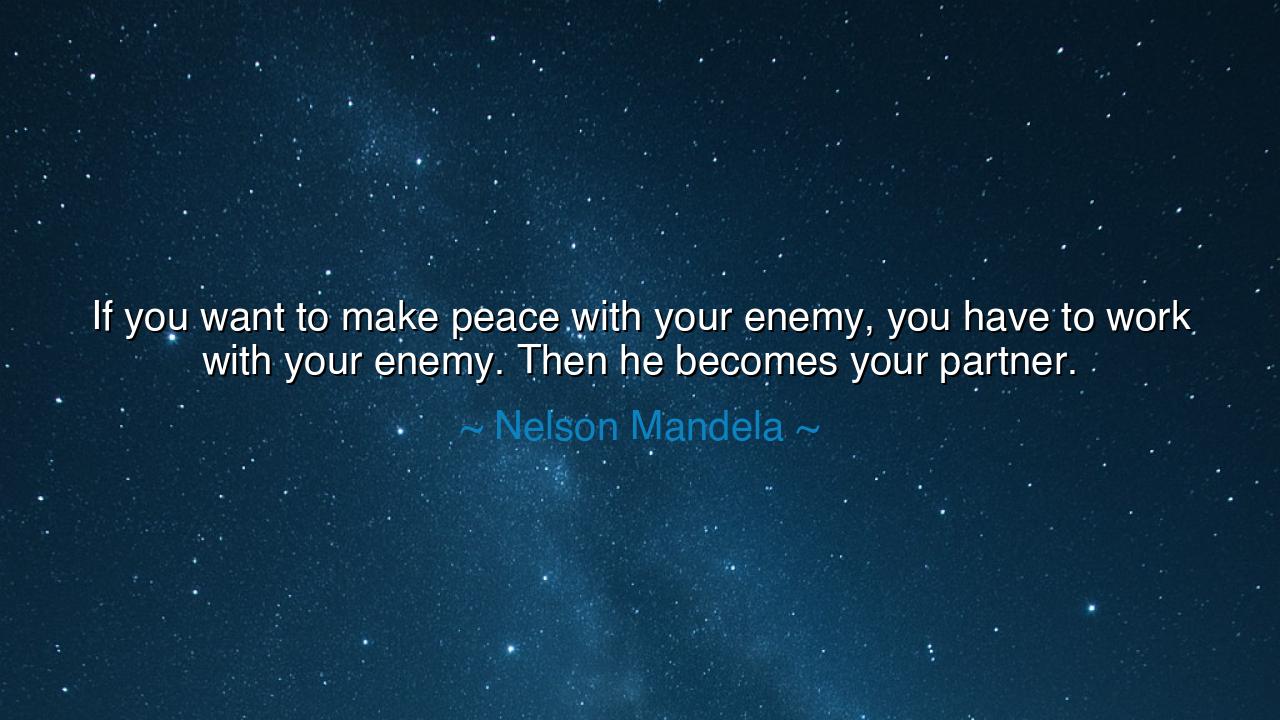
If you want to make peace with your enemy, you have to work with
If you want to make peace with your enemy, you have to work with your enemy. Then he becomes your partner.






So spoke Nelson Mandela, prisoner-turned-leader, who endured the shadows of captivity to emerge as a guiding light for his people: “If you want to make peace with your enemy, you have to work with your enemy. Then he becomes your partner.” These words are not mere rhetoric, but the distilled wisdom of one who faced hatred, injustice, and oppression, yet chose the higher path of reconciliation. They are not the words of a dreamer, but of a man who transformed conflict into fellowship, and in so doing, reshaped the destiny of a nation.
The meaning is clear and yet profound. True peace cannot be forged by distance, avoidance, or vengeance. To turn an enemy into a partner, one must enter into dialogue, must labor together toward common goals, must discover the humanity that dwells even in those once despised. For hatred thrives in separation, but withers when men walk side by side, striving toward the same horizon. Thus, Mandela’s wisdom echoes the eternal law: reconciliation requires not only forgiveness, but shared endeavor.
The origin of these words lies in South Africa’s long night of apartheid. For decades, the land was torn between oppressors and oppressed, the rulers hardened by fear, the ruled crushed by injustice. When Mandela emerged from twenty-seven years of imprisonment, he might have chosen vengeance. Instead, he chose to sit at the same table with those who had once denied his humanity. By working with his former enemies, he transformed them into allies. His leadership brought forth the miracle of peaceful transition, sparing his country the civil war that many had feared was inevitable.
History provides other mirrors of this truth. Consider Abraham Lincoln, who during America’s Civil War spoke of binding up the nation’s wounds “with malice toward none, with charity for all.” He knew that after the cannons ceased, the Union could not endure unless the defeated were made partners in the rebuilding. Or remember Ashoka the Great of India, who after waging bloody war at Kalinga, renounced conquest and sought to govern by dharma, treating former foes as fellow citizens. In each case, the leader chose not the sword of vengeance, but the plow of reconciliation, turning enemies into partners for the sake of lasting peace.
Mandela’s teaching is also deeply personal. For each of us has known enmity—not only among nations, but in families, in friendships, in workplaces. To make peace with those who have wronged us, it is not enough to say “I forgive” and then turn away. Forgiveness becomes complete when it is joined to action, when we find ways to build something new together, so that yesterday’s wounds may be healed by today’s labor. This is how enemies become partners, and how hearts are transformed.
The lesson, then, is both heroic and practical. If you face conflict, do not harden your heart or cling to distance. Seek ways to work with those who oppose you. Begin with small steps: a shared task, a shared goal, a shared vision of what might yet be greater than your division. Let your efforts speak where words falter, and let shared labor reveal the humanity of the other. For often, in building together, the wall of enmity crumbles without a blow.
Thus, Mandela’s wisdom stands as a torch for all generations: “If you want to make peace with your enemy, you have to work with your enemy. Then he becomes your partner.” Let us not forget that true peace is not born of avoidance, nor of conquest, but of cooperation. It is a discipline, a labor, a covenant. And those who dare to walk this path will find that the fiercest foe can, through shared struggle, become the strongest ally. This is the way of the ancients, the way of the wise, and the way of those who would leave behind not ashes, but harmony, for the world to inherit.






AAdministratorAdministrator
Welcome, honored guests. Please leave a comment, we will respond soon